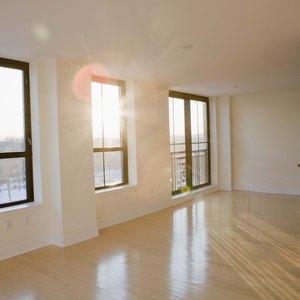
On the surface, the differences between owning an apartment or condominium – as opposed to a house – can seem minor, but they do exist. They can be inconsequential for some, but deal-breakers for others. Apartments can also offer leasing options that can be attractive for certain people.
The Skinny on Apartments
In most people's minds, apartments are something you rent, not buy. The landlord actually owns it, and your rent payments don’t build equity or entitle you to any ownership. That’s one of the commonly-cited drawbacks of apartment living: renting for years with nothing to show for it. You also have very limited options regarding what you can do to the unit. Even simple remodeling such as painting often requires permission from the landlord. In some markets, however, it is possible to purchase a unit within a building or apartment complex. Although there are some distinctions, if you buy an apartment, in practical terms, you're buying a condo.
The Ins and Outs of Condominiums
When you buy a condo, you’re usually buying only the interior space, but this gives you some freedom to customize it to your taste and needs. The same is often true of an apartment you purchase. The exterior of the building and the grounds surrounding it are owned by the community or landlord, and chances are you’ll have to pay some form of periodic dues to your owners association for their upkeep. You also generally can't do anything to the exterior – such as painting your front door or planting a tree – without prior approval from the owners association.
What is the Difference Between a Condo and an Apartment?
The main difference between owning a condo vs. apartment has to do with the community. Condos are typically shared communities in which the residents have a say when it comes to rules about aesthetics, safety and similar issues. If your community is mostly owner-occupied, you’ll have to deal with some measure of enforced cooperation with your neighbors. Some people like the relative orderliness such an arrangement can offer, but others may find it restrictive. Apartments often have community rules, too, but they’re usually set and enforced by the landlord, giving you little if any say about their content or application. When you buy an apartment, it’s also possible that many of your neighbors will be renters, and that can mean frequent move-ins and move-outs.
Renting as an Option
Buying either an apartment or a condo is a significant commitment. If you're not ready to take that step, however, renting can be a workable option. This can be especially true for younger families who may not yet have the resources to deal with unexpected repair costs if a furnace or water heater needs to be replaced, for example. When you rent, the landlord is typically responsible for those costs. Renting also has the benefit of letting you move out after your lease is up if you choose, without having to worry about selling your home. You might even look for a rent-to-own condo, where the monthly rent is slowly paying of a seller-financing loan.
References
Writer Bio
Christopher Williams has owned and operated his own small business since 2002, and has a wide range of professional experience in retail, sales and insurance industries. He's been writing professionally since 2004.

